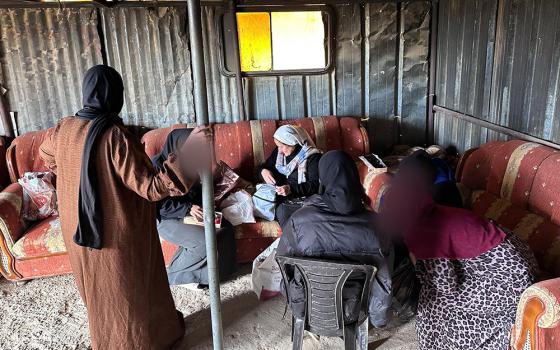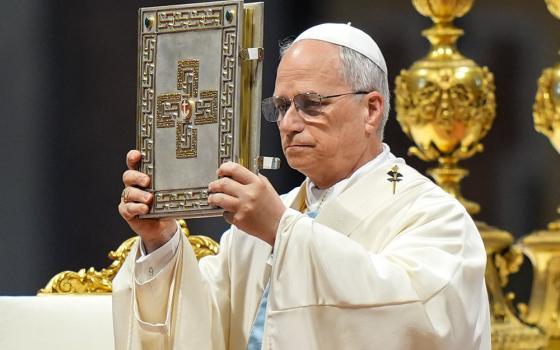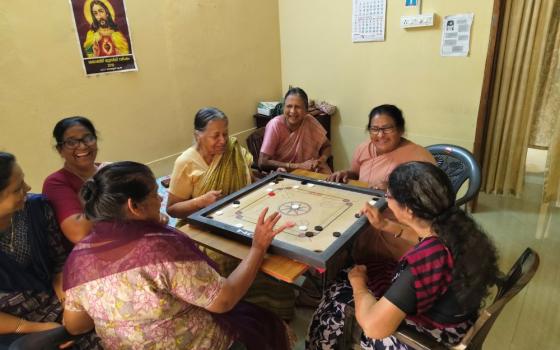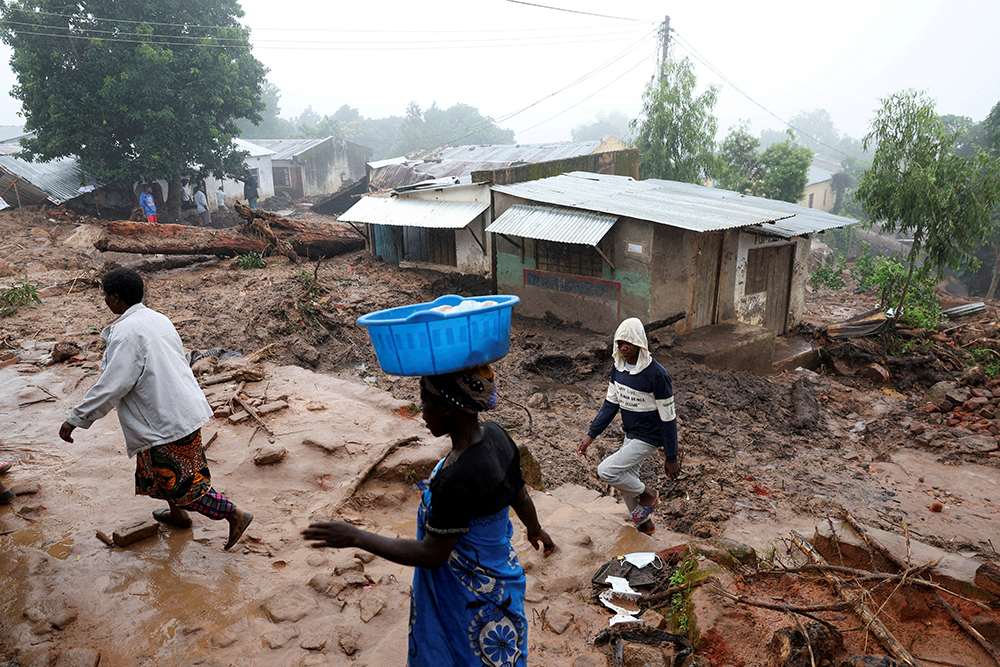
People walk past houses March 17 that had been damaged in the aftermath of Tropical Cyclone Freddy in Blantyre, Malawi. (OSV News/Reuters/Esa Alexander)
Religious sisters and other church leaders in Malawi, Madagascar and Mozambique are aiding victims of Tropical Cyclone Freddy, which has killed more than 600 people and displaced hundreds of thousands of others since it struck in late February.
The storm first made landfall in Madagascar on Feb. 21 and moved to southern Mozambique on Feb. 24. According to a World Meteorological Organization report, the cyclone moved back across the Indian Ocean before landing for the second time in Mozambique on March 11. The storm then moved inland toward southern Malawi.
From her convent in Zomba, Malawi, Sr. Marie Blandina Kamba of the Sisters of Presentation of the Virgin Mary recalled watching torrential downpours escalate to flooding, washing away houses before her eyes.
"I saw people being swept away. It was a terrifying picture," she said. "People came running to our convent. We opened our doors to them," hosting hundreds of cyclone victims in their convent. "However, we relocated them to a camp near us because the numbers kept growing, and we had minimal space."
The record-breaking storm destroyed thousands of homes, health facilities, crops, schools, power lines, roads and bridges, water systems, markets and other public buildings.
Patricia Phiri, 38, is among thousands of residents in Blantyre, Malawi's commercial capital, affected by the strong winds, floods, and mudslides that have hit the southern African countries.
On March 14, while they were asleep, Phiri heard her neighbors wailing before the heavy floods from the nearby mountain swept through her house and everything in her homestead. Phiri's husband died while going back to the house to grab a few things.
"We had already moved to higher ground, and we were all safe, but my husband wanted to rescue some of the household items, and he was swept by water on his way back to the house," the mother of four said. "We now live in a church but don't have enough food and other items to use. We are suffering, and the situation worsens as more people flood the church and other places."
In Malawi, religious sisters and other church leaders have launched a solidarity campaign to assist victims of the floods who have been displaced and are mainly staying in churches and schools. The campaign aims to raise funds for food, clothes, clean water, diapers for children, mosquito nets, medical supplies, bedding, sanitary towels, and other personal hygiene items. The funds will also be used to offer psychosocial support and build shelters for the victims.
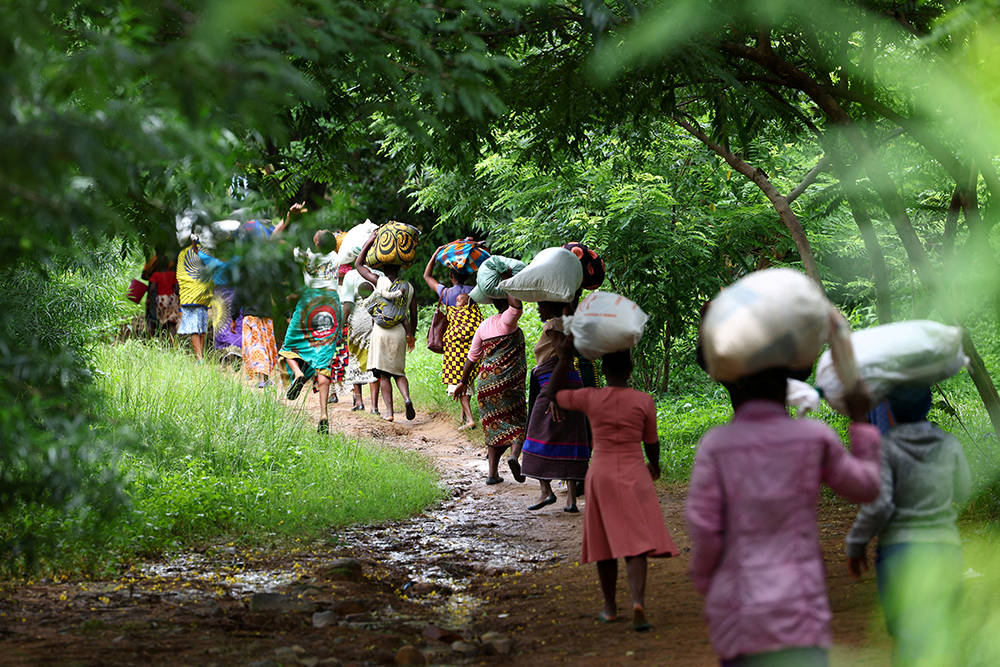
Flood victims from Mtauchira village carry food received from the Malawi government in Blantyre on March 16 in the aftermath of Tropical Cyclone Freddy, which destroyed their homes. (OSV News/Reuters/Esa Alexander)
The cyclone most affected Malawi, a southern African nation of over 19.5 million people, with more than 650,000 displaced in 747 sites as of March 31. The Malawi Department of Disaster Management Affairs has tallied 676 deaths, with at least 537 still missing and 1,724 injured.
Kamba, whose family and village were also affected by what may be the world's longest tropical cyclone, said people lost everything and urgently need life-saving humanitarian assistance.
"The village [where] I was born was submerged in water, but people managed to escape, but they lost everything," she said. "Initially, we couldn't assist them. We were helpless and devastated by the heavy floods and deaths because this was not something we had seen before."
Kamba said they have been raising funds and relief items for the past few weeks at their convent and the local church to help affected individuals and families.
"We have a big task here. Apart from distributing food and other relief items, we are constructing houses for some families, yet we don't have money," she said, noting that there had been slow progress in reaching everyone because of a lack of funds. "More help needs to be sent to this side because every day, there are needs. We are running out of supplies, and sisters are the only hope here."
Sr. Eneless Chimbali, a Servant of the Blessed Virgin Mary, said Blantyre, where she works, was hit hardest, prompting Malawi's President Lazarus Chakwera to declare the commercial capital a state of disaster.
Chimbali, a senior program officer of All-Africa Conference: Sister to Sister, said her office swiftly swung into action to avert the situation in the southern part of the country, which had experienced massive destruction due to the cyclone.
All-Africa Conference: Sister to Sister is a program that assists religious sisters in sub-Saharan Africa in their efforts to address HIV and AIDS. The ministry works in six sub-Saharan nations: Cameroon, Malawi, Nigeria, Uganda, Zambia and Zimbabwe.
Chimbali said she immediately directed her office in Blantyre to disburse funds to sisters in southern Malawi to help themselves and the people they serve in various communities. She said the storm affected over 100 sister families from southern Malawi; some lost family members, while others are still missing kin.
"Sisters are the ones who society runs to when in trouble; therefore, they need to be helped first for them to be able to serve others better," said Chimbali, the former secretary general of the Association of Consecrated Women in Eastern and Central Africa.
Advertisement
The nun said the sisters in southern Malawi have established temporary camps near the affected areas, also being used as rescue centers for cyclone victims. Due to many people arriving daily in the camps, sisters have been forced to accommodate others in their convents, she added, and the situation is worsening as funds continue to decrease.
With the country already recovering from a recent cholera outbreak, the floods revived the spread of the bacterial infection.
"People in these camps are sick," Chimbali said. "They need to be relocated but have nowhere to go."
She said the sisters have also established psychosocial support centers to help individuals and families: Most survivors are experiencing trauma from witnessing loved ones die or heavy floods destroying their homes and properties. Chimbali said psychosocial support would help survivors process their experiences, accept their situation, heal, and hope for the future, and that sessions would go on for at least a year.
In Mozambique and Madagascar, Catholic leaders are appealing for humanitarian support for victims of the cyclone, which killed 165 people in Mozambique and 17 in Madagascar and displaced thousands. The leaders said the churches felt compelled to accept families into their compounds, and the victims were urgently in need of food, shelter, clothes, water, and medical care.
"We want to appeal to all Catholic Christians, people of goodwill, and our partners to join forces to help our brothers and sisters seriously affected by Cyclone Freddy to restore their lost human dignity," said Archbishop Inácio Saúre of Nampula, president of the Episcopal Conference of Mozambique, in an appeal March 16.
Meanwhile, other church leaders from neighboring countries, such as Zambia, have joined their colleagues in the affected countries to raise funds and relief items for the cyclone victims.
"We are concerned about our brothers and sisters in these three countries, especially in Blantyre, where many people have died, and others have nowhere to live and nothing to eat," said Bishop Patrick Chilekwa Chisanga of Zambia's Mansa Diocese.
"The Bible encourages us to help each other," he added. "Therefore, I urge all Christians with whatever they have to help our suffering brothers and sisters."





